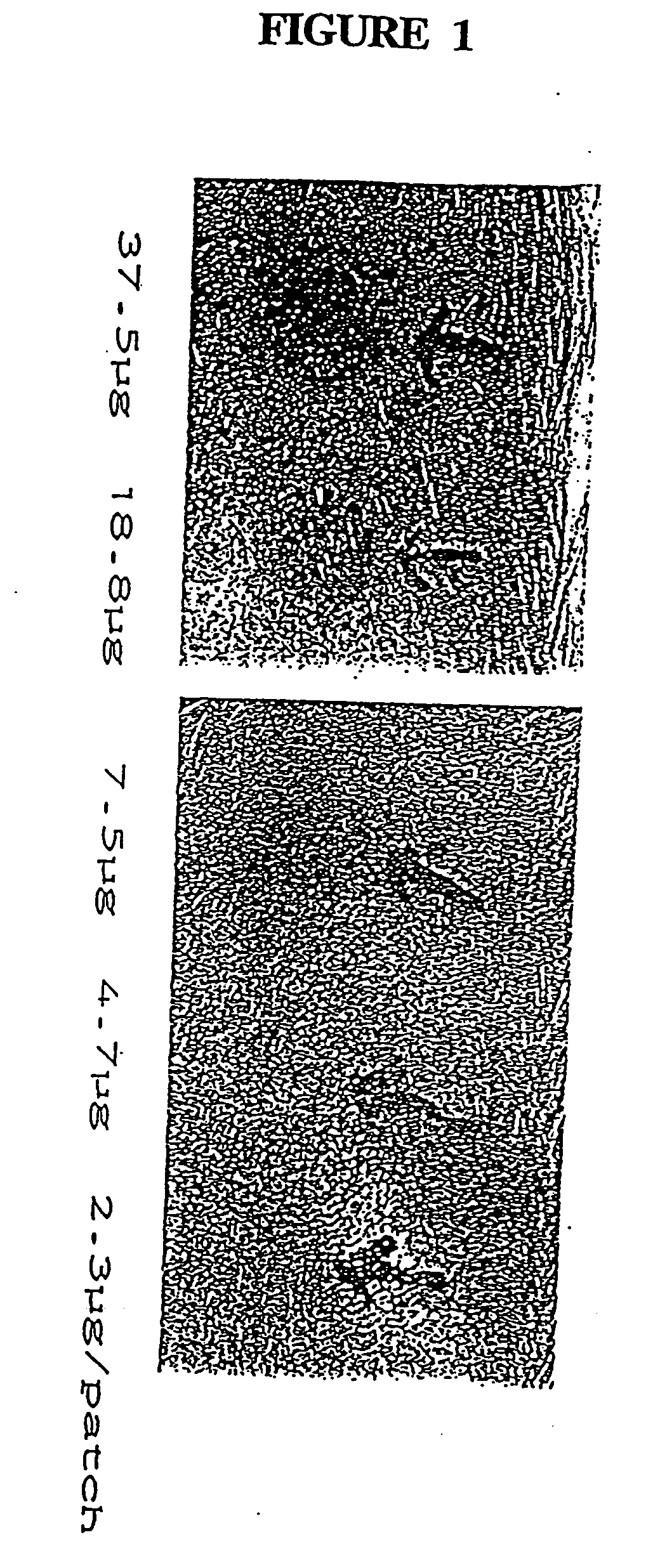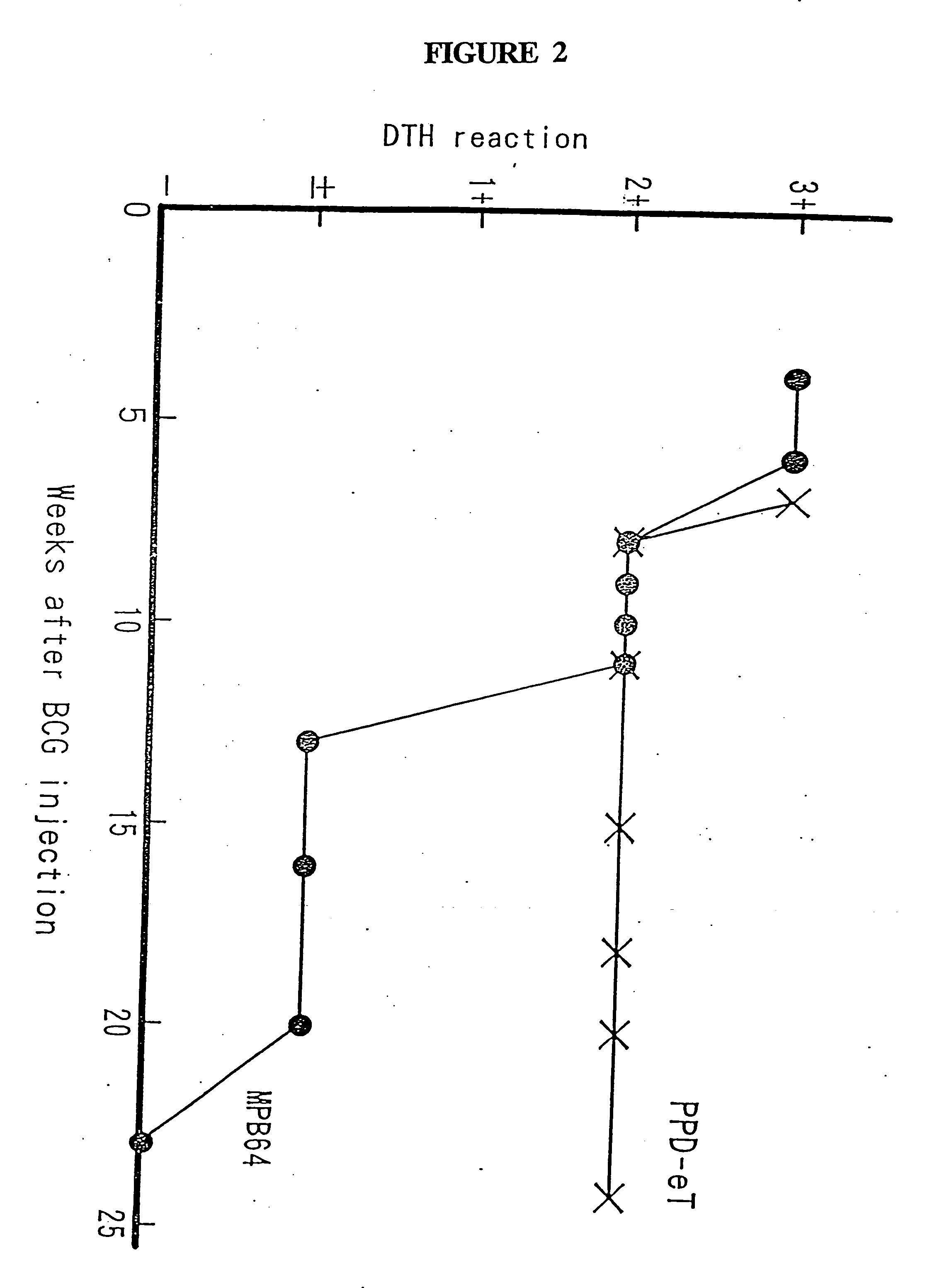Methods and compositions for detection and diagnosis of infectious diseases
a technology for infectious diseases and compositions, applied in the field of transdermal delivery systems, can solve the problems of sensitive and specific diagnostic methods and compositions provided herein, and achieve the effect of convenient administration
- Summary
- Abstract
- Description
- Claims
- Application Information
AI Technical Summary
Benefits of technology
Problems solved by technology
Method used
Image
Examples
example 1
[0071] To test the development of a new, simple and rapid diagnostic method for active tuberculosis, subjects were tested for skin reaction to the antigen MPB64 by a transdermal delivery method following topical application of an antigen composition using removable patches.
Skin Patch Preparation
[0072] Although antigens such as MPB59, MPB70, MPB44, MPB45 or MPB51 or MPB64 may be used in the patch test of the present invention, in the following example the antigen used was MPB64 in a concentration of approximately 75 μg per patch. It is contemplated that approximately 50 to 100 μg of antigen may successfully be used per patch. A preferred antigen solution comprises approximately 750 μg antigen per ml of phosphate buffered solution (PBS), wherein the PBS consists of 0.005% Tween 80.
[0073] The patches were applied on the skin of the test subjects, left on for three days, and the results were interpreted by observing the site following removal of the patch. The presence of an immunol...
example 2
[0077] To determine the reliability of MPB64 as a specific antigen for diagnosing active TB using the skin patch method, comparative tests were conducted among three different classes of individuals: [0078] (1) active TB patients [0079] (2) healthy tuberculin-positive persons [0080] (3) household TB-contacts
[0081] Correlation between skin reaction to MPB64 and the clinical status of TB in humans was observed. Because the purpose of this study was to determine the reliability of MPB64 as the specific diagnosing antigen for active TB, the selection of active TB patients was most important.
[0082] Clinical records of the outpatients coming to the clinics were checked. Those patients who were sputum-smear positive, had an abnormal CXR, and had clinical symptoms indicating active TB were classified as active TB patients, Group 1. Culture results were not available in most cases. The patients who had started chemotherapy shortly before were preferable because the effect of long-term chem...
example 3
[0095] In order to determine the reliability of MPB64 as a specific diagnosing antigen for active TB using the skin patch method, comparative tests were conducted on guinea pigs.
[0096] Female albino Hartley guinea pigs weighing 300 to 400 g at the beginning of the experiments, were purchased from Japan Laboratory Animals, Inc., Tokyo. Animals were maintained under specific pathogen free conditions at the Japan BCG Laboratory.
Antigens
[0097] Antigens were prepared according to the methods and materials set forth in Example 2.
Immunization of Guinea Pigs
[0098] Live BCG vaccine (Japan BCG Laboratory, Tokyo, Japan) was reconstituted according to the manufacturer's instructions and injected subcutaneously without adjuvant into guinea pigs at a dose of 0.5 mg per animal. The animals were tested between 4 and 25 weeks after the BCG injection.
Materials of Patch Test
[0099] TORII's patch band (Torii and Co., Ltd., Tokyo, Japan) of 7-mm gauze size was used. An antigen solution (75 μg o...
PUM
 Login to View More
Login to View More Abstract
Description
Claims
Application Information
 Login to View More
Login to View More - R&D
- Intellectual Property
- Life Sciences
- Materials
- Tech Scout
- Unparalleled Data Quality
- Higher Quality Content
- 60% Fewer Hallucinations
Browse by: Latest US Patents, China's latest patents, Technical Efficacy Thesaurus, Application Domain, Technology Topic, Popular Technical Reports.
© 2025 PatSnap. All rights reserved.Legal|Privacy policy|Modern Slavery Act Transparency Statement|Sitemap|About US| Contact US: help@patsnap.com


